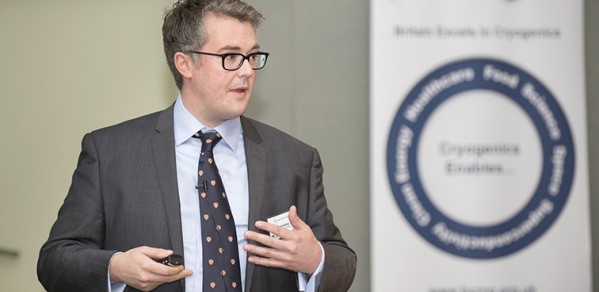
Dr Mark Ainslie of the Bulk Superconductivity Group has secured a five-year £1.1 million Early Career Fellowship from the EPSRC.
I will be combining my state-of-the-art numerical modelling techniques and extensive knowledge of the PFM technique to produce portable and commercially-viable high field magnet systems.
Dr Mark Ainslie
The Fellowship will start in July and Dr Ainslie will build a research team to develop portable, high magnetic field charging of bulk superconductors for practical engineering applications.
Bulk superconductors can be used – when cooled to cryogenic temperatures – as super-strength, stable permanent magnets generating fields of several Tesla, compared to the 1.5-2 Tesla limit for conventional permanent magnets.
This makes bulk superconductors attractive for a number of engineering applications that rely on high magnetic fields, including compact and energy-efficient motors and generators, as well as compact and portable magnetic resonance imaging (MRI) and nuclear magnetic resonance (NMR) systems.
It is also possible for scientists to use high magnetic fields to exploit the magnetism of materials for controlling chemical and physical processes, which is attractive for magnetic separation and magnetic drug delivery systems (MDDS), for example.
Dr Ainslie, a Royal Academy of Engineering Research Fellow, said: “The main challenge in exploiting these materials in practical applications is the ability to magnetise them with a simple, reliable, portable and cost-effective technique. Pulsed-field magnetisation (PFM), which involves the application of a large, pulsed magnetic field with a timescale on the order of milliseconds, shows the most promise in this regard.
“One significant challenge is that the trapped field is generally smaller than the theoretical maximum of the material, due to the temperature rise from the rapid dynamic movement of magnetic flux in and out of the material.
“As part of this Fellowship, I will be combining my state-of-the-art numerical modelling techniques and extensive knowledge of the PFM technique to produce portable and commercially-viable high field magnet systems.”
Dr Ainslie will be working with project partners from Adelwitz Technology Centre, Cryox Limited, Oxford Instruments and Siemens Magnet Technology to accelerate the development of the technology, as well as his close academic collaborator in Japan, Professor Hiroyuki Fujishiro from Iwate University, the world-leading expert in PFM, who holds all PFM magnetic field records to date.
Last year, Dr Ainslie, in conjunction with Professor Fujishiro, achieved a bulk superconductor magnetic field record and in 2014, Dr Ainslie was part of a research team, led by Professor of Superconducting Engineering David Cardwell, which achieved a new Guinness World Record for a trapped field in a superconductor.

